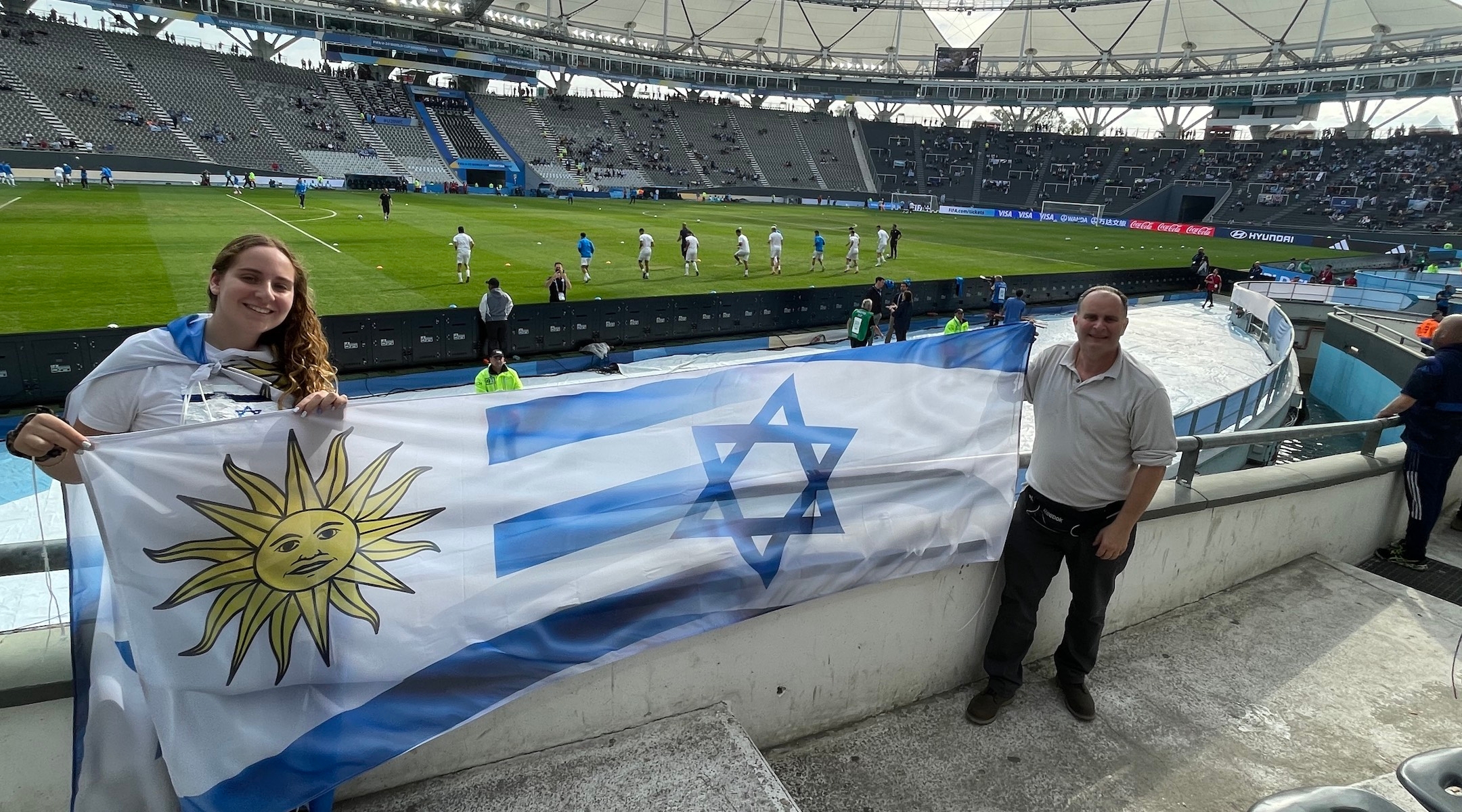Israel’s historic U-20 World Cup soccer run comes to an end with loss to Uruguay
The team’s success hinted at a bright future for Israeli soccer and gave South American Jews reason to party for two weeks straight

Stav Lemkin of Israel, left, battles for the ball with Andres Ferrari of Uruguay during the FIFA U-20 World Cup semifinal at Estadio La Plata in La Plata, Argentina, June 8, 2023. (Tim Nwachukwu/FIFA via Getty Images)
LA PLATA, Argentina (JTA) — The most successful run in Israeli soccer history came to an end on Thursday, as the country’s under-20 team lost in the semifinals of the FIFA U-20 World Cup to Uruguay.
The 1-0 loss means Israel will play the winner of the other semifinal match between Italy and South Korea in a third place game.
Local Jews and Israeli visitors made up a large portion of the crowd of over 27,000 at the stadium in La Plata, Argentina, a city about 40 miles outside of Buenos Aires. They chanted in Hebrew and waved Israeli flags while rooting for a team that repeatedly came from behind for a series of stunning underdog wins en route to the semifinal.
“The support from the Jewish community really helped us,” midfielder El Yam Kancepolsly told the Jewish Telegraphic Agency after the match. “Soccer in Israel is improving, we have a good generation, and the people understand what we can do.”
The lone goal Thursday was scored by Anderson Duarte in the 61st minute. Israel had previously qualified for one World Cup, the general edition in 1970, at which they scored one goal and did not make it past the first round. In this tournament, the under-20 team scored eight times in beating teams such as Japan and Brazil.
The competition was originally slated to be played in Indonesia, which protested Israel’s participation. FIFA objected to the protest and moved the tournament to Argentina, home to a Jewish community of close to 200,000.
“It’s shocking, we have a very good future in Israeli soccer. This is something new in the history of the country,” said Ilan Zarfati, father of Israeli team’s goalkeeper, Tomer Zarfati.

But beyond showcasing a new generation of talent, Israel’s first-ever appearance in the under-20 tournament brought together South American Jewish fans, highlighting the strong pro-Israel sentiment in their communities. Jewish groups and community centers held watch parties, and thousands showed up to the team’s games.
On Thursday, Israeli fans brought 500 t-shirts emblazoned with Stars of David that they gave away to fellow supporters in the stands. Members of the Hasidic Chabad-Lubavitch movement brought tefillin to Jewish fans in the stands and outside the stadium in La Plata.

Fabian Zaidenberg, the rabbi of the Jewish community in Mendoza — a city over 600 miles west of Buenos Aires — said the tournament brought him mixed emotions.
“On Shavuot here, we can’t get a minyan, we were seven people … and last Shabbat we were exactly 10, just at a minyan,” he told JTA last week, after the match between Israel and Japan held in Mendoza. A minyan is a prayer quorum of 10 men. “It is incomparable how attractive an Israeli match is… 500 from our community were at the field.
“I was there with families of the community, it was a big joy, it was a party of sports and identity. What is a kind of contradiction, or in fact what hurts me, is the big difference in the appeal of a soccer match in comparison with an activity on Shavuot or an activity in a synagogue,” he added. “I want this in the synagogue.”
This article originally appeared on JTA.org.













